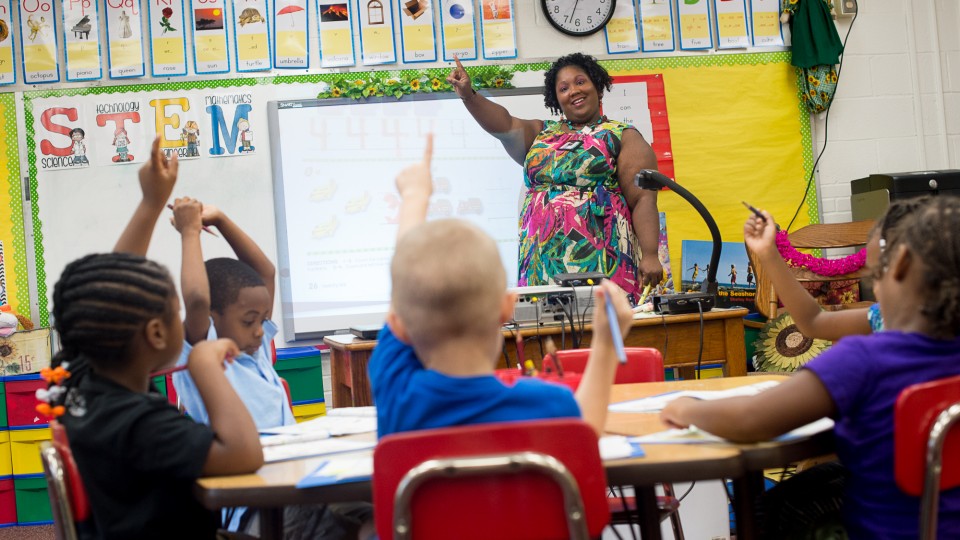Kindergarten readiness rates stalled another year
- March 8, 2016
- / Shannon Nickinson
- / early-learning,report-sci-early-education

Students work on numbers in La’Tris Sykes kindergarten class at Lincoln Park Primary School. Research shows that investing in quality early education pays dividends.
For the second consecutive year, state education officials will not release data about how many Florida 5-year-olds were kindergarten ready.
The state budget, which is in its 72-hour mandated “cooling off period” after being approved late Monday night, contains language that directs the Florida Office of Early Learning not to accept readiness rates for 2015 or 2016.
It also directs that providers of voluntary prekindergarten who were on probation and considered low performing will be remain status quo for another year.
Rodney J. MacKinnon is the executive director of the Office of Early Learning in Tallahassee.
He said via email that the Legislature’s decision that there be no kindergarten readiness rate for the 2014-2015 or 2015-2016 academic years will allow time to get a new kindergarten screening process in place.
"Because of changes to the Florida Kindergarten Readiness Screener, this year’s preliminary results did not accurately reflect whether students were actually ready for kindergarten," MacKinnon said. "Trying to calculate provider profiles that parents could use to make VPK selections for their children would not have been beneficial."
In Escambia County, the most recently available public data shows that 66 percent of kindergarteners were ready based on the Florida Kindergarten Readiness Screener (FLKRS).
That means nearly 1,000 of the school district’s 3,000 kindergartners were not ready for school.
The Florida Department of Education revamped the way kindergarten readiness is tested last year.
Because of those changes, Escambia County appears to have made a nearly 24-point leap in readiness in two years — from 66 percent in 2014 to nearly 90 percent for 2016 based on preliminary data released to VPK providers.
That’s a leap of faith that officials in both early education and in the K-12 system are not willing to make.
“The results they got in were so much different than the year before,” says Bruce Watson, executive director of the Early Learning Coalition of Escambia County, which oversees prekindergarten providers in the county. “The children were now miraculously more ready for kindergarten.”
Officials in Duval County have expressed similar concerns based on the increase seen from preliminary data there.
Watson says preliminary data also show no VPK providers with a readiness rate below 70 percent — the threshold a center must meet or be dubbed a “low-performing provider” and face probationary sanctions.
In 2013, the state classified as low performers 23 VPK providers in Escambia County.
The readiness data are incomplete compared to previous years — and with more changes coming in the next school year, it won’t be easy to compare to future years.
Watson said he he looked at the decision with mixed opinions.
"On the one hand the decision to not adopt a readiness rate for VPK programs for another year because it was based on assessments of uncertain reliability was probably well founded,"he said. "However, the suddenness of the decision and decisive manner in which it was taken through legislation, as opposed a reflective policy decision on the part of the Department of Education and Office of Early Learning concerns me.
"I feel for our providers who took the unofficial results and publicized their results, particularly those who lauded the fact they were off probation," Watson said. "They now have to retract their comments and take a step back because they will still be listed in their former status.
"Similarly, I feel for those providers who will now be extended in their probationary status for another year, especially those that have made strides and deserve to come off of probation," Watson said.
MacKinnon said this year's readiness test "measures different things (than previous tests). It’s observational, it’s more soft skills and I don’t think it’s a rigorous academically as the process that involved (the previous test).”
The 10-year-old Florida program provides funding for voluntary prekindergarten free to every Florida 4-year-old — about $2,437 per child this school year. Escambia County’s share of that for the current school year is $5.4 million.
VPK can be offered during the school year for 540 hours of instruction — which works out to about 3.5 hours a day — in classes no larger than 20 children, or during the summer for 300 hours in classes no larger than 12 children.
This school year, 2,080 4-year-olds are enrolled in VPK in Escambia County.
 CivicCon launches with a look at good growth in cities
CivicCon launches with a look at good growth in cities
 Building stronger brains one baby, one parent at a time
Building stronger brains one baby, one parent at a time
 SCI debuts commercial on Early Learning City
SCI debuts commercial on Early Learning City
 Entrecon: World class speakers and an opportunity to sharpen skills
Entrecon: World class speakers and an opportunity to sharpen skills
 PYP Quality of Life survey 2017
PYP Quality of Life survey 2017
 EntreCon Pensacola 2016: A look back
EntreCon Pensacola 2016: A look back
 Leadership tip: getting better employee takeaways
Leadership tip: getting better employee takeaways
 Leadership tip: be interested instead of interesting
Leadership tip: be interested instead of interesting
 Leadership tip: delivering difficult messages
Leadership tip: delivering difficult messages
 Brain Bags boost Arc, Early Childhood Court programs
Brain Bags boost Arc, Early Childhood Court programs